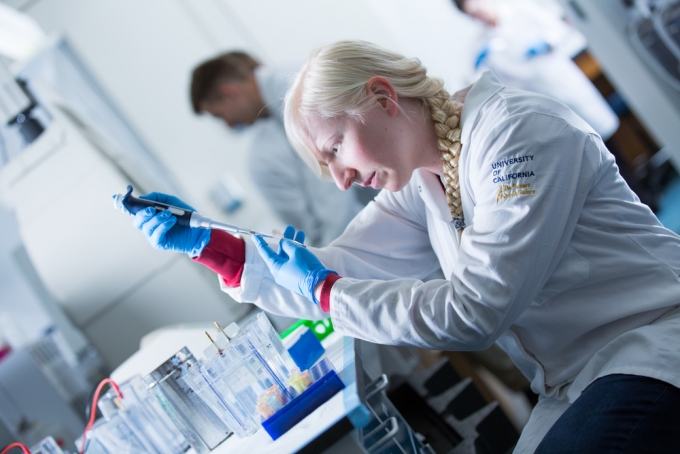UC Santa Barbara researchers will play an essential role developing new bio-derived products as part of a new institute started by the U.S. Department of Defense (DoD). The BioIndustrial Manufacturing and Design Ecosystem (BioMADE) will be funded by a seven-year, $87.5 million award from the DoD that is being matched by more than $187M from non-federal sources. Led by the Engineering Biology Research Consortium (EBRC), BioMADE will collaborate with public and private entities to advance sustainable and reliable bioindustrial manufacturing technologies. UCSB is a governing member institution of the BioMADE manufacturing center.
“UCSB is fortunate to have strong expertise in both synthetic biology and materials science, which will be integral foci of this new center,” said Michelle O’Malley, a chemical engineering professor at UCSB, who is a member of the EBRC’s Individual Membership Committee. “Society typically thinks about using biology to make medical interventions like pharmaceutical drugs, vaccines, and cell therapies. BioMADE is important because it is the first US government manufacturing center to focus on harnessing the power of biology to make an array of non-medical products that include polymers, chemicals, fabrics, coatings, flavorings, and food supplements just to name a few.”
O’Malley says faculty involved with UCSB’s Institute for Collaborative Biotechnologies (ICB) and the BioPolymers, Automated Cellular Infrastructure, Flow, and Integrated Chemistry: Materials Innovation Platform (BioPACIFIC MIP) will interact with BioMADE. The ICB, primarily funded by the U.S. Army, aims to enhance military technology by transforming biological systems into technological applications. The BioPACIFIC MIP, a collaboration between UCSB and UC Los Angeles to use natural building blocks to create new materials, was recently started through a five-year, $23.7 million grant from the National Science Foundation (NSF).
Headquartered on the St. Paul campus of the University of Minnesota, BioMADE will work to establish long-term and dependable bioindustrial manufacturing capabilities for a wide array of products. Anticipated bioindustrial manufacturing applications include the following products: chemicals, solvents, detergents, reagents, plastics, electronic films, fabrics, polymers, agricultural products (e.g., feedstock), crop protection solutions, food additives, fragrances, and flavors.
“The Department of Defense is committed to promoting U.S. biotechnology innovation and securing America’s bioindustrial base. Through today’s award, we are pleased to work with new partners to accelerate the Department’s biotechnology modernization and the development of this field which is so critical to our Nation’s future security and prosperity,” said Michael Kratsios, Acting Under Secretary of Defense for Research and Engineering.
The institute’s efforts will examine and advance industry-wide standards, tools, and measurements; mature foundational technologies; foster a resilient bioindustrial manufacturing ecosystem; advance education and workforce development; and support the establishment and growth of supply chain intermediaries that are essential for a robust U.S. bioeconomy. Other important focus areas include challenges related to biosafety and security and ethical, legal, and societal considerations.
“Bridging the gap between lab-scale research and at-scale manufacturing, BioMADE builds an on-ramp to accelerate commercialization of biotechnology inventions originating from American R&D in universities, start-ups, and National Labs. I am grateful to the proposal team of more than 30 companies, 33 universities, 24 community colleges, and six nonprofits across 31 states that worked with us to develop a winning proposal,” says Douglas Friedman, Executive Director of EBRC and CEO of BioMADE, which joins a network of eight additional Manufacturing Innovation Institutes established by DoD to leverage innovation and commercial best practices in the advancement of the United States’ competitive technology lead and national security interests.

